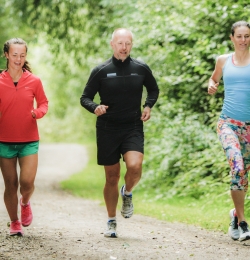
Training can take a big toll on the body, as can an event. With that in mind we must take nutrition seriously, regardless of the individual goal. There isn’t a rigid formulae for a training programme and every individuals training programme will be different, suiting their individual needs, lifestyle, fitness level and experience. It then goes to say that there is no nutrition plan that will be a fit all for everyone. Any training programme for an endurance athlete, ie. Running, triathlon etc. will need an increase in calories during the training period. The increase can be in excess of 3-4000 calories per day for long distances. Remember ‘training lifts you to the stage on which you can perform’, so it is important that training nutrition needs are met.
Many thousands of training and nutrition do’s and don’ts have been published over the years. There are two food groups of nutrition advice that have sustained the test of time. Carbohydrate & Protein. Whilst there are many nutritional needs to be considered, for the purpose of this article we will limit the discussion in this article to carbohydrate and protein guidelines.
Daily and during training, it is a top priority that a consistent energy status is established through increased muscle stores of glycogen, hydration, and replenishment particularly as each training session will use up the stores quickly and need fast replenishment.
The 1st priority is to fuel the carbohydrate stores prior to training, the 2nd priority is to hydrate fully (we will discuss hydration in our next article), the 3rd priority is to sustain both muscle glycogen stores and hydration through the longer distance training and any events and the 4th priority is to replenish optimally after training.
Fuelling priorities
Daily carbohydrate guidelines expressed as a percentage of energy intake
Critical source of fuel for exercising muscle. Carbohydrate levels should be considered every day to fuel well for training. Here are some guidelines.
Gen/mod training level 50-60% Energy intake (kcals)
- End training 50-70% Energy intake (kcals)
- Restricted Energy diet 60-70% Energy intake (kcals)
Average cal/day Carbohydrate (g)
1500 240
2000 320
2500 410
3000 490
3500 570
4000 650
Carbohydrate guidleines expressed as grams per kilogram of body weight per day
- 5-6g CHO – 60 mins training per day
- 6-8g/kg/d mod training athletes 60-120 mins intense
- 8-10g/kg/d end. training athletes 120 mins +
- 10g+/kg/d extreme exercise
During Training or Event
If training or an event is less than 60- 90 minutes then it is not necessary to take on board extra carbohydrate as you will have sufficient stores.
If training or an event is in excess of 90 minutes then consume 50-90 grams of carbohydrate per hour over long training or an event. You need to practice with this and see which is your optimum level. You must also practice with how you ingest the carbohydrate. It is important to have established this through your training and only use at an event what you have tried and tested as optimum through your training. If taking carbohydrate in liquid form then no more that 6-8% glucose in a fluid mix, non carbonated. Any concentration that is higher may interfere with hydration. The longer the training or event then the more important this guideline is. Try to use a mixture of methods and not all gels or fluid. The longer the event, the more mixed methods are recoemended. Try to eat some high glycemic foods as well as supplements such as gels.
Post Training Meal Timing
Early post exercise recovery is marked by an increased passage of glucose into muscle to replenish glycogen stores through an increased muscle cell sensitivity to insulin. It is important to use this recovery window, especially if you are training again the next day. The first 30 mins after training or event is crucial. Rates of replenishment stay elevated for 2-4 hours post training/event and then return to normal replenishment rates, which can be as long as 48 hours to replenish stores fully. Imagine training the next day on depleted stores.
- 4g glucose per hour during the first two hours of recovery
- 72g glucose 2-4 hours after
- If short recovery between sessions – crucial
- If more than 24 hours between sessions then normal eating patterns
- Every 15 mins during recovery
- High GL foods – not fructose
- Solid or liquid equally effective
Protein Daily Requirements
- Protein requirements are increased by training
- Extra kcals. required will automatically increase protein if using percentage of energy intake as protein guidelines. 12-30% is recommended.
Protein daily guidleines expressed as grams per kilogram of body weight per day
- 1g/kg/d – 1.7g/kg/d general sports activity
- Strength training 1.6-1.7g/kg/d
- Endurance athletes 1.2-1.6g/kg/d
- Adolescent athletes 1.5 – 2.0g/kg/d
- Pregnant athletes extra 10g per day trimester 2 and 3
- Breast feeding athletes extra 20g per day
Meal Training Meal timing
- Carbohydrate and protein within 2 hours of the exercise session affect muscle protein synthesis (MPS) allowing the downstream creation of lean muscle mass and repair.
- Thirty minutes after exercise
- Nearly doubles the insulin response, which results in more stored glycogen and passage or amino acids through the muscle membrane
- The optimal carbohydrate to protein ratio for this effect is 4:1 (four grams of carbohydrate for every one gram of protein).
Eating more protein than that, however, has a negative impact because it slows rehydration and glycogen replenishment.
If you are interested in learning more about nutrition, consider attending our new sports nutrition award.
